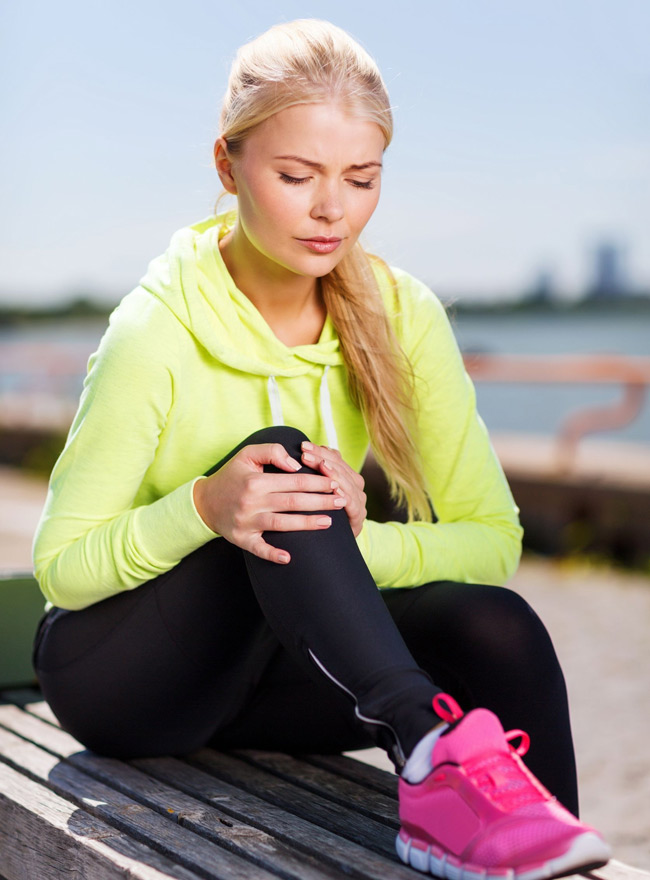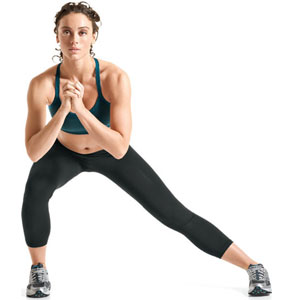
Female athletes are two to six times more likely to suffer an injury (specifically, knee) than men, in sport activities. Women are more likely to develop patellofemoral pain syndrome (“runner’s knee”), the degeneration of the shock-absorbing cartilage under the kneecap that can occur in many kinds of sports and activities. And they’re especially susceptible to a debilitating rupture of the anterior cruciate ligament (ACL), which helps stabilize the knee joint. Injuries to weight-bearing joints like the knee, as well as the ankle and hip, increase the risk of osteoarthritis. You can reduce their occurrences with exercise and regular conditioning.
1. Side step squat:

- Stand with good posture, knees soft, feet together, left foot lifted and prepared. Breathe easily throughout.
- Step left leg wide to the side. Drop the hips down and back behind the heels while swinging the arms forwards for balance. Keep knees in line with feet and the chest lifted.
- Step the right leg into start position, squeezing your buttocks and abs as you stand up. Start with 8, work up to 20.
INCREASE THE EFFORT
Maximize the effort you put into your lower body workout to see results quickly. Work as slowly and precisely as possible to perfect a move, then alternate the speed to keep challenging the muscles.
2. Plie with arms:
- Position feet slightly wider than hip-width apart with legs gently turned out, arms relaxed at your sides and pelvis in neutral.
- Keep chest lifted and ribs in line with hips as you bend the knees and take the arms out to the sides. Keep your heels down and your knees in line with your toes.
- Squeeze buttocks and quads hard as you straighten the legs and lift the arms up. Keep the knees soft, abs tight, shoulders down.
- Bend knees deeply, smoothly bringing the arms down and out to the sides. Then straighten the legs, squeeze the buttocks and quads bring the arms to start position.
Keep the back straight as you bend the knees. Breathe easily throughout Keep the upper body and hands free from tension.
3. Dip squat:
Increase the challenge of this exercise by altering the timing and emphasis of the movement. For example, bend down for one count and spend three counts.
Coming up. Try the same in reverse, or hold the position for 2 – 4 seconds. Use hand weights if you wish.
- Squat down until the thighs are parallel to the floor, hips behind feet and with all the weight on the heels.
Swing the arms in front of you for balance and momentum. - Squeeze the buttocks tight and push the hips forward as you stand up.
Pull arms to the sides of the hips.
Repeat 5 times, progressing to 20.
TOP TIPS
Keep the back straight and the chest lifted, leaning forwards from the hips. Both these moves require constant attention to the alignment of knees over feet.
4. One-legged squat:
The American Council on Exercise recently declared this to be the most effective bottom exercise in the world ! Use a chair for support if you haven’t yet mastered this tricky position.
- Stand tall with neutral pelvis, abs tight. Place the right foot just in front of you, touching the floor. All weight should be on the rear foot.
- Drop hips backwards and bring your arms up for balance. Your left knee remains over the left foot. Stand up by curling the hips forward, squeezing the buttocks and pulling the arms in. Repeat 5 times on each leg, progressing to 20.
5. Drop lunge:
This exercise is demanding, working the thighs, hamstrings, hips and buttocks. Getting down and up actively, with good alignment and posture, is no easy feat. Use a chair for support to begin with, and watch out for the most common fault – of allowing the knee to slide in front of the supporting foot – by looking in a mirror. Move down and back up as cleanly as you can. Start by doing 2 – 4 drop lunges, about two seconds down and two seconds up, but aim for 15 – 20 lunges. You can, of course, go slower than this count, but not faster.
- Take a stride forward with the left leg and place the foot flat on floor. Balance on the ball of the rear right foot. Keep the body upright, pelvis neutral and abs tight.
- Bend knees and lower until rear knee is just off the floor. Keep back straight. To come up, push down against the front heel and squeeze the buttocks hard
TOP TIPS
- Swing arms out on descent
- Pull in arms on the recovery
- The front knee should be above the ankle and the rear knee below the hips
6. Feet – together squat:
This works the gluteals, quads and hamstrings. Start with 10 squats and progress to 20, about two counts down and two counts up. To add variety or intensity, descend for one count and spend three counts coming up. Try also holding the lower position for 2 – 4 seconds, or using hand weights.
- Stand with good posture, feet together and knees soft. Bend the knees and drop the hips down and back behind the heels, moving the weight to the heels. Swing the arms for balance, keep the chest lifted and the back long.
- As you stand and stretch the legs, pull arms in towards hips and squeeze buttocks hard.
7. Buttock squeeze and stretch:
This is a relatively easy exercise for the gluteals. Keep your face, neck and shoulders free from the tension you are building in your gluteals. Try to breathe easily throughout. As you squeeze, don’t lift the hips too much – the emphasis is on the contraction, not the height.
- Lie on your back, hands at your sides. Keep the right foot on the floor and the right knee bent. Place the left ankle on the right knee.
- Tighten abs and lengthen the back. Curl the hips upwards so that the buttocks lift off the floor. Squeeze the buttocks for 2 – 4 seconds, then carefully lower until the buttocks skim the floor for one second. Then continue: repeat 10 times on each leg.
STARTER EXERCISE
Buttock squeeze and stretch is a great starter exercise, or one to do while watching television.Keep both feet flat on the floor to make the exercise less intense, or hold the top of the contraction for a few extra counts to make it more difficult.
8. Gluteal stretch:
Lie on the floor and place the left ankle on the right knee. Push the left knee outwards.Pull the right thigh towards the chest with both hands. Breathe easily. Hold for 10 counts. Repeat on the other leg.
9. Rear leg raise:
This is an adaptable exercise that works the gluteals and hamstrings. Alter the intensity by increasing the speed or using ankle weights.
- On all fours, lean on your forearms. Stretch right leg out behind you. Tighten the abs and lengthen your spine. The hips should be above the knees, shoulders above your elbows.
- Lift right leg, squeezing hamstrings and gluteals with more intensity as you raise your leg. Do not allow shoulders or hips to twist. Keep your back straight and control the leg movement, about two seconds up and two seconds down. Repeat 10-20 times on each leg.
10. Shoulder stretch:
Knell and lower the hips down. Reach arms out and place forehead lightly on the floor. After a few seconds, walk the fingers further forwards to stretch a little more and relax.
Related links
- Working the Hamstring
- Get Ready to Shake Your Butt
- Top 10 to Correcting Muscle Imbalance
- Top 10 to Beautiful Bottoms